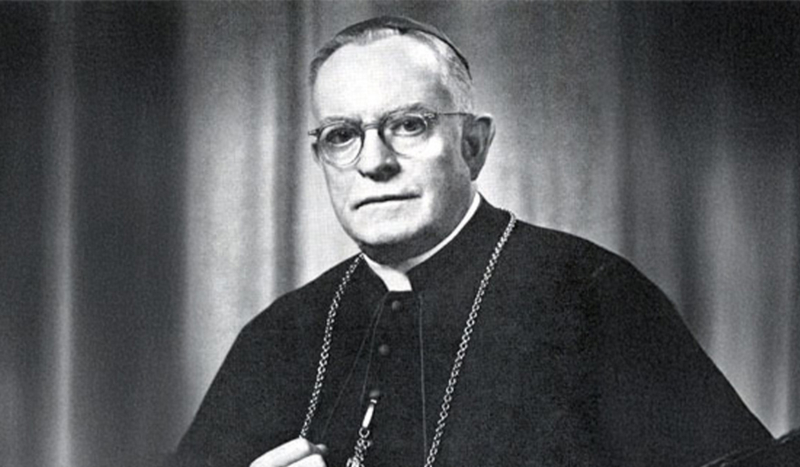
Bishop John Francis Noll by Karen Noll / Find a Grave
The bishop of Fort Wayne-South Bend penned a June 30 tribute to the legacy of the late Archbishop John Francis Noll, founder of Our Sunday Visitor (OSV) and staunch defender of the faith, on the anniversary of the archbishop’s 100th ordination to the episcopacy.
“We give thanks that the Holy Spirit indeed inspired Bishop Noll’s mind and soul,” Bishop Kevin Rhoades wrote in the article for the diocesan publication Today’s Catholic. “Bishop Noll’s legacy lives on in our diocese and in our country through the many fruits of his labors, including Our Sunday Visitor.”
Archbishop Noll was ordained to the episcopacy as the fifth bishop of Fort Wayne-South Bend on this day in 1925. In 1953, the Holy See honored Bishop Noll with the title of “archbishop.” His legacy is marked especially by his historic efforts in national and local media evangelization.
Born in Fort Wayne in 1875, Noll was one of 19 children, according to the Bishop Noll Institute. He entered preparatory seminary when he was 13 years old, and was ordained to the priesthood at 23 years old in 1898. Enlivened by an evangelistic zeal as a new pastor, then-Father Noll spent much of his efforts on catechesis for his parishioners, as well as defending the faith from people who came to his town to slander Catholicism.
He eventually recognized a great need among non-Catholics for access to resources about the faith to answer questions they had or to combat misconceptions. He began publishing small catechetical pamphlets that soon became requested by priests from around the country. In 1908, he began writing a lengthy periodical called the Parish Monthly, now known as the Family Digest.
Bishop Rhoades wrote, “I believe it was his experience in these first years of his priestly life that Father Noll found his personal mission to evangelize and catechize, leading to his founding of Our Sunday Visitor and his creative publishing ventures that reaped great success locally and nationally.”
In 1911, a socialist group and others began creating anti-Catholic publications, to profit from anti-Catholic sentiment, according to the Institute. Fr. Noll recognized that the diocesan-based Catholic press did not have a large organized means to combat these publications, so a national weekly publication needed to be established that could serve that purpose.
He founded Our Sunday Visitor in 1912, and within a year more than 400,000 copies of its paper were circulating the country. For the next several years, he continued writing faith-based books and “became well known for his astute understanding of Church issues and his deep knowledge of current events,” according to the Institute.
After he was ordained bishop of Fort Wayne-South Bend, his zeal for catechesis, apologetics, and evangelization continued strongly both at the local and national level, according to Bishop Rhoades.
Noting that while Bishop Noll was deeply involved in OSV and other national commitments, he remained a “man of great energy and capacity for work, [and] did not shirk his diocesan responsibilities,” wrote Bishop Rhoades.
“He was truly a pastor of the local Church,” he added. “He was the first native son of the Diocese of Fort Wayne to serve as bishop of the diocese.”
The late archbishop promoted the diocesan Catholic Charities, the St. Vincent de Paul Society, and the Legion of Mary, and oversaw the growth and construction of a diocesan orphanage. According to Bishop Rhoades, priestly vocations in the diocese also increased under then-Bishop Noll.
Bishop Noll also used OSV to raise awareness among Catholics in the US about religious persecution in Mexico and anti-Catholic forces in Europe before World War II, according to Bishop Rhoades.
“He was an outspoken foe of atheistic communism,” he wrote. “After the Second World War, Bishop Noll, especially through funds from Our Sunday Visitor, actively supported the resettlement of immigrants to the United States who had been displaced by the devastation of the war.”
Recognizing the importance of culture’s impact on a nation’s morality, Bishop Noll also eventually joined several bishops to found the Legion of Decency, which rated and classified motion pictures’ moral content.
Bishop Noll was an astute financial leader as well, leading him to serve as the treasurer for the American Board of Catholic Missions and the secretary of the National Catholic Welfare Conference (which preceded the United States Conference of Catholic Bishops). In 1946, he was tasked — by election to chair of the bishops’ committee — to raise $7 million to finish the project to create the National Shrine of the Immaculate Conception in Washington, D.C. After eight years of fundraising, the goal was reached.
Bishop Rhoades emphasized that “the priestly life and ministry of Bishop Noll would not be complete without mentioning ‘the apple of his eye,’ the Missionary Sisters of Our Lady of Victory.” The Sisters were founded by Father John Sigstein to serve and educate the poor, many of whom were Mexican, in the southwest US, according to Bishop Rhoades.
Bishop Noll supported them financially and spiritually and built a motherhouse called “Victory Noll” for them in Huntington, Ind.
“[He] chose to be buried in the Victory Noll cemetery, rather than the cathedral crypt, to be near the sisters and to be the beneficiary of their prayers,” Bishop Rhoades wrote.
Archbishop Noll died July 31, 1956.
“As we remember the 100th anniversary of his episcopal ordination,” Bishop Rhoades wrote, “may we be resolved to carry on his mission of spreading the truth and beauty of our Catholic faith, the Gospel of Jesus Christ!”
Bishop Rhoades’ full tribute can be read here.
